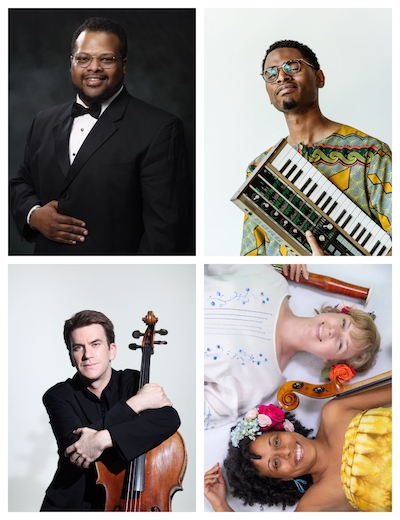by Jarrett Hoffman

•Today: tenor Steven Weems sings spirituals, pianist Julian Davis Reid reflects on his ancestry and his experience as a Black performer-composer, Sororii blends cello, bassoon & vocals, and CityMusic is joined by cellist Edward Arron
•Announcements: “Reframing Disability” webinar, and “Practicing Wellness” workshop
•Interesting reads: “Claire Chase Is Changing How People Think of the Flute”
•Almanac: music for piano (and guitar) by Isaac Albéniz
HAPPENING TODAY:
Two events in conjunction with The Cleveland’s Orchestra’s American Dream festival bookend today’s schedule.
The first is a 6:00 pm program of spirituals performed by tenor Steven Weems titled “Finding the Dream,” illustrating the evolving meaning of Black freedom and the history of the spiritual as “roots music” for blues, jazz, and gospel in America. The recital — which takes place at the Cleveland History Center and is part of an African American history initiative from the Western Reserve Historical Society — includes opening remarks by Regennia N. Williams on “Dreaming with Our ancestors and Singing in the Spirit.” Ticket information here.
At 7:30 pm at Severance Music Center’s Reinberger Chamber Hall, the festival continues with an event titled “The American Dream, The American Nightmare, and Black American Music.” Pianist Julian Davis Reid will reflect on his own experience as a Black composer and performer, the descendant of voluntary and involuntary migrants, all while illustrating the presentation with works including Duke Ellington’s Come Sunday, Herbie Hancock’s Dolphin Dance, and Marvin Gaye’s What’s Going On. It’s free.
The evening also includes free events from the Local 4 Music Fund and CityMusic Cleveland.
At 7:00 pm at the Julia De Burgos Cultural Arts Center, Local 4 will present Sororii (Afro-Colombian cellist/vocalist Carolina Borja, and bassoonist/vocalist Arleigh Savage), a group that was formed in 2021 with the spirit to reclaim sisterhood and explore feminine voices across cultures. Their music blends melodic bassoon lines, plucked and strummed cello, and voice, creating instrumental grooves with underlying world, Latin, and Afro beats.
And at 7:30 pm at Temple-Tifereth Israel, the CityMusic Orchestra will be joined by Edward Arron in the first of four performances of Joseph Haydn’s Cello Concerto in D. The program also includes Franz Schubert’s Overture in the Italian Style, Chen Yi’s Romance of Hsiao and Ch’in, and Felix Mendelssohn’s Symphony No. 4 (“Italian”).
ANNOUNCEMENTS:
On May 25 at 2:00 pm, the Ohio Arts Council will present a webinar titled “Reframing Disability” led by Art-Reach director of education Katie Samson. The talk will cover disability etiquette, respectful language, and ways to build allyship — topics that touch on every level of the workforce, from marketing to fundraising, education, building management, and administration. Register here.
Looking further ahead, on June 9 and August 11, Steinway Piano Gallery Cleveland will present “Practicing Wellness,” a two-part summer workshop series for musicians, students, and teachers to help reinforce healthy habits, set goals, develop mental health strategies, and prepare for the academic year ahead. Learn more here.
INTERESTING READS:
The New York Times profiles flutist Claire Chase ahead of, as Joshua Barone writes,
a marathon of 10 performances looking back on the past decade of her “Density 2036” project, a colossal initiative intended to last 24 years in which she has commissioned annual new works for the flute, leading up to the centennial of Edgar Varèse’s solo for her instrument “Density 21.5.”
Read “Claire Chase Is Changing How People Think of the Flute” here.
TODAY’S ALMANAC:

And there’s a reason that those guitarists saw fit to make those transcriptions. As part of Albéniz’s interest in mining Spanish folk music as material for his compositions and getting at the essence of Spanish music, he in fact transferred idioms of the guitar over to the piano. So in a way, the transcriptions harken back to the roots of the composer’s inspiration.
On that note, let’s compare the piano and guitar recordings of the popular Asturias (Leyenda). That work was born as the first movement of a suite for piano titled Chants d’Espagne — written after Felipe Pedrell, an important teacher of Albéniz who inspired him to write Spanish music.
Here’s Croatian guitarist Ana Vidovic, a name that Clevelanders may be familiar with given her past appearances on the Cleveland Classical Guitar Society’s International Series and the at the Cleveland International Classical Guitar Festival. And, in contrast, here’s pianist Luis Fernando Pérez.
To me, it’s interesting to see how, physically, the piece is so different to perform on these different instruments, which are laid out in such different ways — and how that translates to the ear.
If you’re looking for more deaths to mark on this date — relatable — think of composer-conductor Gustav Mahler, who passed in 1911, composer Leroy Anderson, who passed in 1975, and baritone Dietrich Fischer-Dieskau, who died in 2012.



